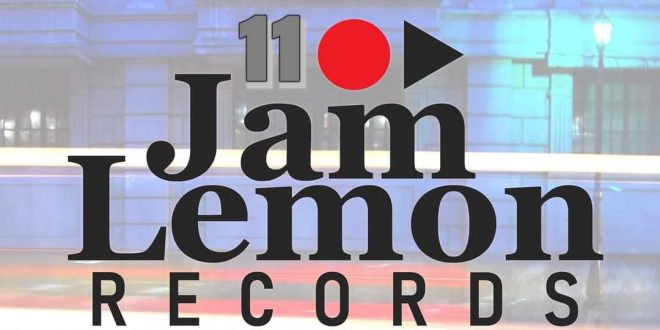Earlier this month, Jam Lemon Records marked its 11th year as a label. Headed by singer/songwriter Rob Equiza, the Philippines-based indie label specializes in recording, production, and management of local rock, pop-rock, alternative, and folk-oriented acts. These past two years, Equiza continued to expand his team, the label subsequently integrating a visual arts and literature component, and most notably, a 24/7 internet-based station, Jam Lemon Radio, which has since accumulated a diverse, international artist roster.
I caught up with Equiza to discuss the development of his musicianship, the execution and growth of Jam Lemon Records, as well as what he has gleaned from his journey thus far as a musician and label owner.
Prior to starting Jam Lemon, your primary endeavor was as a singer/songwriter. What was your musical environment like growing up?
I’d gotten into the world of music very early on. My dad was, and still is, a musician himself. He plays multiple instruments, writes songs, sings, and he’s quite popular in our city – as a matter of fact, in our whole province. Aside from that, my uncle was also a well-regarded songwriter, my grandmother taught music and dance, and their friends were all local musicians. I can remember my siblings and I seeing my dad record his songs right in our living room. Lots of different types of music could be heard throughout our house, and very loudly. We had all that jazz – literally ‘all that jazz’ (laughs), and there was rock and pop as well, so it’s a given.
That’s awesome! Did those instances also factor into your songwriting at the time?
With regards to songwriting, that aspect actually didn’t come to mind until I was probably in my late teens. Even though it was embedded in me, I was concentrated more on performing other people’s songs. I think it’s normal for kids to go against whatever type of music their parents are into, and so my original songs turned out very different.
I see. Your music tends to go in the alternative/folk rock direction, and alongside that, you started your career on your own merits.
Yeah. I like how you notice that. In fact, that’s why I have my mom’s maiden name as part of my artist name, because I didn’t want people to say, “Oh, he’s the son of a recognized jazz artist; he must sound the same.” I just wanted to create a name of my own, and base it on my own abilities and experiences.
When it comes to indie labels in the Philippines, there are several, like Twisted Red Cross in the 80s, JML in the 90s, and Lighter in the early to mid-2000s. With Jam Lemon Records, did you take cue from those labels of the past, or did you base the process more on instinct?
That’s a good question. Most people I know would initially be influenced by the ethics of certain labels, or even certain bands. For me, it was much later on that I was aware of Twisted Red Cross, and other indie labels here in the Philippines. A lot of what I read was actually about labels from the West, like Sub Pop, Creation Records, 4AD, and Rough Trade. I love those labels, and when acknowledging their influence, I told myself, “This is what’s available to me, and this is what I’ll apply on my own.” So, the original idea behind Jam Lemon Records was to put out my own releases, as well as those of several of my friends. We didn’t even care if there was a demand for this music – just as long as we put it out and had a few affable people behind it.
I know that, like me, you studied communications in college. Similarly, does that background also have a subtle connection to this process, or was it a separate entity?
There were quite a lot of things I’d learned in communications. When it came to my peers, they tended to not pursue something after college directly related to that major, and it didn’t seem to have any real effect on where they are now. For me, I guess it did somehow enhance my skills and talents related to that field, and I do have an inherent love for communications in general. I can remember being a lot younger, being influenced by how people use art in media to disseminate that information.
So, in some profound way, it did play a part in manifesting where you would be later on.
Yeah! In fact, once I started doing Jam Lemon Radio, I was jiggity on my first broadcast, like, “Oh my God, this is similar to what I did when I was younger, and my audience was just my two younger siblings,” and now, it’s materialized!
At what point would you say the goal for the label started taking shape?
The goal started materializing in the very beginning, once we thought of an overall sound for the label, just like Sub Pop did in the 80s and 90s. I’ve noticed that, when it comes to other indie labels, they’ll claim to be inclusive, but at some point, they’ll let their snobbish mentality take over, and that goes against my advocacy of service. These days for Jam Lemon, half of the goal involves service, and the other half involves balancing that with the art side of things, and being open-minded to different types of music. I’ve definitely become more aware of that, and even though the label hasn’t catapulted to a high status, it does have a much wider audience as compared to before.
In other words, you’ve cared more about the organic merits of the music that come through, and not necessarily whether the music is a flawless product.
Yeah, that’s the word – organic. When guys in my position are largely critical about a song’s production, it creates a crutch for the art of music. Recently, I was listening to the band Colossal Youth, who have this very minimal approach, and I’m surprised I hadn’t heard of them before. With bands like them, it’s really their songwriting that gets to me. I guess it’s because I’m more enamored by the production values of the 60s to the early 90s underground scenes. In fact, that’s why I came up with the tagline “Bring back the sound.”
How has your experience been in getting the word of Jam Lemon out to other musicians and bands?
It’s always been very clustered when it comes to artists deciding whether we’re a good fit for them. Even today, some artists still express hesitance because they’re holding out for bigger labels. How I see it, Jam Lemon Records is simply a stepping stone for artists, and if they decide to eventually go with someone else, that’s totally up to them, as long as we were able to provide our services to them at a time they needed them most. Luckily, many local artists are willing to work with us, and to this day, I still stand by that principle.
Ultimately, you’d still need to work with them as much as possible.
Right! Whatever my beliefs may be in the moment, I can’t impose them on other artists. Until now, we have impacted artists through our online radio, so they’re still able to utilize that service regardless of their involvement with the label.
How did Covid-19 impact the flow of things at the label?
When Covid happened, our operations were stalled, and we really were impacted financially. In fact, probably in mid-2019, we were actually starting to earn a bit of income that factored into recording, production, gigs, as well as equipment rentals. There was a lot of investment going in, and now, that equipment is just rotting away (laughs). Until the pandemic hit, some of the work was exhausting but still fun and rewarding, and especially because we had income at the time. Now, the label is home-based, but we had to adapt, you know? Even though gigs are gone, we’re still able to produce, and we’ve had a lot of great artists we’re working with now, whether they’re directly involved with the label or not. Our main source of income is through Patreon donors, but the community has gotten at least 10 times bigger than it used to be.
Have you been able to stomach the impact of Covid, for the most part?
Well, at first, like a lot of people, we were like, “We’ll wait and see what happens.” Obviously, we weren’t prepared for it lasting as long as it has, especially in the Philippines. But in the meantime, I’m always coming up with new ideas, and I’m an impulsive guy, so I tend to act upon implementing them right away. In fact, during our first lockdown, that’s how I came up with the radio idea, which has helped us get by until now.
So, once Jam Lemon Radio came about, that was really implemented as a result of the pandemic, is that right?
Yes, that’s correct. Interestingly, Dodge from The Ballsbreakers and I had bounced ideas off one another about starting a radio show for underground artists. Eventually, we started hosting it through zeno.fm, which allows you to load up all the music you have and play it 24/7. I initially made it play exclusively Jam Lemon Records-produced tracks, but because of our consistency, it just grew into something that accommodates artists around the world.
Was there quite a large learning curve in terms of understanding the software?
Oh yeah (laughs). It seemed like I was going through a big maze, but like a lot of things, rather than try to study 100 percent of the material, I just went for it. I felt like, “This is what I’ll implement based on what I know, and if there’s a better way to improve my work process down the line, whether it’s a feature or a plug in, I’ll be sure to apply that.” In our early days on Facebook, we just used audio, but it took around five months before we were able to add a video component to the stream. At first, I was hosting the shows by myself, but I quickly realized that I’m more natural when other people are involved. That’s when my friend Franz Perez came in, and as we went along, we thought of different programs to make the show more interesting, and yeah, that’s what led us to where we are now.
As far as listenership for the radio expanding, how were you able to make that grow in the same way?
It’s mostly us spreading the word to friends, and then through friends of friends, since we don’t have the budget to advertise it the way huge companies would. I guess what also drove that factor was consistency. There were times when we had very few listeners, but we would still go on. In the back of our minds, anyone can listen through replays, and the artists that were played can tell their friends about the station once we’ve tagged them in the broadcast, so that has helped us a lot.
One thing I admire about Jam Lemon is that you’re very transparent about working with a team. What can you say about the team you have now, in terms of how they help make things run smoothly?
They’re a dynamic bunch (laughs). In fact, we’re all from different age groups. I’m almost in my 40s, two of our members have just turned 30, and we have a couple of new guys who are 18. But they’re very, very adaptable. Whenever I have an idea, I make sure to run it by them first, so we can polish it up together, and I’m always asking if they have any ideas they can add. Our meetings are constant, and even if some members aren’t available at certain times, that’s perfectly fine as long as the core group is there consistently. I love working with these guys because we’re all artists with different points of view. While I may have my own set idea as to how to present our brand, I also allow them to implement any improvements that could help with reaching a wider audience.
In addition to music, you also have a component of visual arts and literature. Was that originally part of the method, or did you integrate that as more people within your circle wanted to get involved?
Yeah! The idea is that music, along with the visuals and lyrics, are all side by side. Being a 90s kid, I loved being able to focus on the details of the cover art and reading the liner notes. But to answer your question, yes, I have some friends who don’t do music but are involved in visual arts and writing, and I wanted Jam Lemon to be a platform for them as well. Back in 2019, a friend of mine, Jas Mohammad, had an artistic approach she wanted to showcase, so I suggested including it on Jam Lemon as part of an exhibit. Then, later on, when she had written a book, even though we couldn’t publish physical copies, due to the pandemic, we managed to release it digitally. I still encourage my visual artist and poet friends to send in their material because I’m intending to release a compilation of literature.
The good thing about speaking with you is that with many of the answers you’ve provided, I’m able to think of new questions to ask. I’ve always been curious about the Jam Lemon name, which emits a visual aesthetic itself. Where did that name come from? Is it like appreciating a rockin’ jam as much as the beauty of a lemon?
I like how you describe it, and I think I’d justify it in the way of saying ‘Jam’ because I like Pearl Jam, and ‘Lemon’ because most music I love invokes that sourness, but that’s not the real answer, and it’s a question that comes up every now and then. Jam Lemon is actually a wordplay on my favorite Beatle, John Lennon.
I was thinking John Lennon too!
Yeah (laughs)! I was living with a group of friends in an apartment in the mid-2000s, and it became an inside joke. Whenever John Lennon would come up in conversation, someone would say right away, “Who? Jam Lemon?” So, when the time came for me to name the label, that name just came back to me – “Jam Lemon Records…that sounds really nice!” There’s no deeper meaning to it, but in a way, it’s what the label represents.
For 11 years now, you’ve kept Jam Lemon going strong. Does that still take you aback?
It does; it really does. Every now and then I’d tell my wife, “Look at where the label is now!” It’s crazy. I mean, it wasn’t a serious thing when I started, but it’s been a really, really long journey. In the first few years, it was like a leaf being blown around, riding the wind, but now, it’s been taken to somewhere beautiful.
That’s awesome. It’s not only a reminder of where you’ve been; it encourages you to do more.
That’s true, and I’ve been very fortunate to have friends who are as passionate as I am, and who don’t care that we solely rely on donations.
Well, thank God for things like Patreon, because you’ve been able to turn what you love into what it is now!
Yeah, that’s true, I love how you worded that.
Ultimately, what have you learned about yourself, not only as a musician and record label owner, but as a person?
There’s a lot of things I’ve learned, and every year, I make it a point to ask myself, “What’s the biggest realization I’ve made during this past year?” The first one is tolerance, because I used to have tunnel vision when it came to certain types of art, as if to say, “My taste is the best!” But as I’ve gotten to know many more types of artists, it showed me that my choices aren’t always prioritized. Another big thing I’ve learned is I’m better at recognizing the capacities and capabilities of myself and the people on my team. The intelligence between us varies in the sense that one person can be good at something, but not good at another thing, and that’s also applicable to me.
In other words, you don’t denigrate the abilities of people on your team just because they may lack in some areas. You learn to work together and help each other out.
That’s true, and that’s where the delegation part of teamwork comes in, you know? I’m not a big sports guy, but I think I understand now why sports teams have certain rules. It’s the teamwork that gets you to that goal.
Lastly, anything you’d like to say to your listeners?
Just keep going. Lots of people die inside because they lose their sense of passion, but balance is the key to everything. You can still work to pay the bills, but don’t ever forget about that first love – that passion rooted in your childhood. Real joy is earned when you follow your spirit. It’s never going to be an easy ride. There will be bumps and detours, but keep pushing to get to where you want to be.
Jam Lemon Records Socials:
Official Website|Instagram|Twitter|YouTube
Contribute to Jam Lemon Records on Patreon:
https://www.patreon.com/jamlemonrecords
 Music Existence Because of Music, We Exist
Music Existence Because of Music, We Exist




